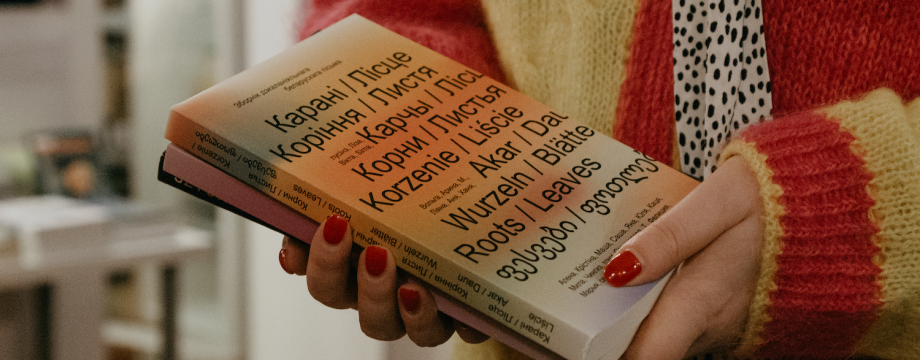A game of association, or a group portrait of Belarusian literature against the background of spring aggravation
Cinema: Searching for Funding and Audiences and Returning to Berlinale
Theatre: pressure, nullification and fragile hopes
Music: timid steps towards a new construction
Traditional Culture: A Move Toward Integration
A game of association, or a group portrait of Belarusian literature against the background of spring aggravation
The author declares spring aggravation as the main metaphor of this narrative. This year, thanks to the weather, it came earlier than usual and, what is important, it came synchronously both in Belarus and on its near and far perimeter. The important geographical difference between Belarus and North Korea is that the political processes in our region do not yet affect the climatic ones. Our blue-eyed country is still integrated into the processes of bird migration, the movement of cyclones with anticyclones, changes in the phases of the moon and the response of the population to a decrease in atmospheric pressure and magnetic storms.
For this text, the author chose the method of arbitrary association, and the principle of chronology and any deduction are rejected to a more stable time in all senses.
Interdepartmental ping-pong in the book sphere
Let’s start unraveling the tangle of literary news from the end. Minister of Culture Anatol Markievič spoke at the Saint Elizabeth (sic!) Monastery. It is this odious location, infamous for its open support of Russia’s military aggression in Ukraine, that on March 29 adopted the “Public-State Partnership in the Preservation of Spiritual and Moral Values of Modern Society” (an untranslatable play on words).
The Minister of Culture reported on the reflected “spiritual threat”, which he compared to radiation, accusing the independent art spaces of Belarus of past years of having replaced real, traditional values with low ones – “under the guise of liberal values and democratic freedoms”. He reported on the purges in the cultural environment and noted that the bet was made to work with young people. Every schoolchild in Belarus will now receive culture dosed and under the control of ideologues, attending once a month “Lesson in the museum” at the expense of the state.
You will ask: what does literature have to do with it? That’s the thing, it seems, it’s not involved at all. From the context of the speech, it follows that culture for the Ministry of Culture, as in the quote about Lenin, is “cinema and circus”. Namely, only spectacular forms of beauty are taken into account: music, theatre, “Belarusfilm”, “Charoški”.
This generally coincides with the vision of the literary process by the domestic officials, the management of which in Belarus is roughly equally divided between the Ministries of culture and education, but in general given to the pro-state Union of Writers. According to the Code of Culture of Belarus, effective since February 2017, literature, books and librarianship are an integral part of culture, but the document completely ignores such a form of existence of the book as a publishing process, the status of publishing houses is not defined, and there is not a single mention of translation as a kind of literary creativity.
In the context of incessant purges, it is perhaps for the best. In the periphery of the attention of the state apparatus, the chance to survive is much greater than in the epicentre. But everything is different when it comes to development, progress and grants. It can be stated with certainty: it is not fun to be a pro-government writer today.
The report on attention to work with youth sounds very strange in light of the fact that in the last days of March, two state publishing houses – “Vyšejšaja škoła” (existing for 60 years) and “Narodnaja aśvieta” (existing since 1951 – celebrated its 73rd birthday on the closing day) announced ceasing their activity on social networks simultaneously. Most likely, it is about their merger with the “Adukacyja i vychavańnie” (English: “Education and upbringing”) publishing house. In order for the reorganization to take place, the Ministry of Information previously transferred the publishing houses to the Ministry of Education. Even earlier, having played this kind of interdepartmental ping-pong, officials got rid of information from the publishing house “Belarusian Encyclopedia” (in 2021 it merged with the publishing house “Belarus”).
It is difficult to think about the exact reasons for such a reorganization, especially at a time when it is necessary to carefully educate the youth, to take care of spiritual security, to rewrite textbooks on literature and history, erasing from them the dubious shadows of the past. It would seem that the state order for propaganda for schools and universities is only going to increase. Here, new structures should be opened, and not the existing ones destroyed. But it is possible to put forward a version that the authorities are significantly reducing the budget for education and culture – and officials are redistributing the remaining modest subsidies, diverting these amounts “to themselves”.
Are publishers in “Ramonak” crowded?
Nothing was heard about these changes from the speakers of the XXXI Minsk Book Fair on March 14-17 at BelExpo. Iran was the central exponent of the international book festival, and among the important topics was the 30th anniversary of the first presidential election in the history of Belarus.
It was not worth uniting the state publishing houses because, it seems, there will be no one to create the illusion of the mass of the domestic publishing industry. Cancellations or suspensions of licenses of independent publishers continue: the magazines “Arche”, publishers “Zmicier Kołas” and “Cymbieraŭ”, which were active participants of the fair in the past, have been removed from the list. Against this background, the statement of the Minister of Information Uładzimir Piarcoŭ, saying that for the first time the booksellers in “Ramonak” were…crowded, is cause for disbelief.
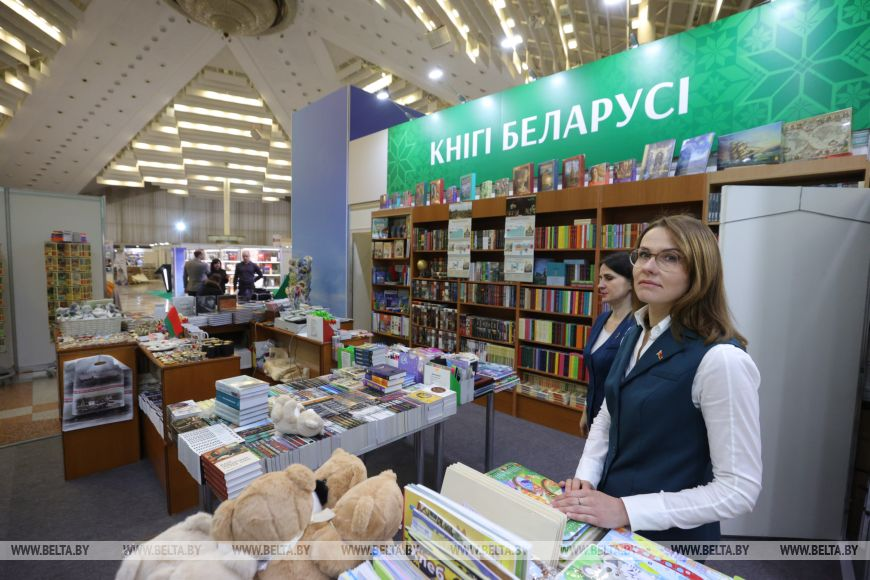
Based on the feeling of the author of these lines, who made a brave spacewalk into allowed printed products, stands and books were spread over the huge BelExpo space like red caviare on a piece of baguette by a poor housewife trying to imitate luxury. Russia’s stand acted as a lemon wedge, and a parsley leaf symbolized China’s stand.
The space was so “crowded” that they had to make an exposition of baroque costumes from the funds of “Belarusfilm” in the lobby of the exhibition centre.
At this year’s fair, the audience was visually small, but in the first days, the Institute of Sociology of the Republic of Serbia organized its survey. You can read the results yourself by following the link, but one cannot fail to note the prankish talent of the researchers:
“The exhibition participants named A. Pushkin, M. Bulgakov, and F. Dostoevsky as the most interesting authors for themselves. (…) It is worth noting that visitors to the event could not immediately remember the books by A.S. Pushkin.”
There are also numbers that the author of this review found useful. Let’s remember them: the popularity of paper books among Minsk readers is 87%, electronic books – 6.8%, audiobooks – 2.8%.
The forum of authors loyal to the state “Writer and Time” (Belarusian: “Пісьменнік і час”) was integrated into the programme of the fair, which was remembered by the public message of Andrej Mukavozčyk. Formally, he reprimanded his propaganda colleagues who are promoting the ideas of the “Russian world” in Belarus.
The quoted publicist has published as many as two books “for the fair” and is taking large steps to become the leader of approved literature. It seems that it is he, and not Aleś Karlukievič – is the odious successor of the very old Mikałaj Čarhiniec in the servile sector of Belarusian literature.
In general, an external examination and collection of anamnesis from open and not so sources can diagnose a dystrophy of opportunities for writers in the country, even if the internal authors are completely “clean” in the eyes of those who organize purges. Ahead is not life, but survival.
Literary process abroad: a conflict of systems?
Outside, the situation is actually not too different. Survival is the word that can be used to describe the literary process in emigration. It’s just that the patient’s prospects are better and the dynamics are generally positive. Writers who cannot return home receive basic support from colleagues in the countries where they find themselves, in the form of scholarships and community projects. Publishers are balancing on a tightrope between cultural grants and donations/negotiations from readers. The format that unites the first and the second is the book fairs of Europe.
The united stands of Belarusian books in cooperation with publishing houses “Pflaŭmbaŭm”, “Januškievič”, Gutenberg Publisher, Skarynapress, Kamunikat and others worked at book fairs in Vilnius (February 22-25) and Leipzig (March 21-24). Saša Filipienka received a prize in France, and the books by Jeva Viežnaviec and Alhierd Bacharevič were presented or announced in translations into various languages. It seems that this trio can be called the face of Belarusian literature in the world today.
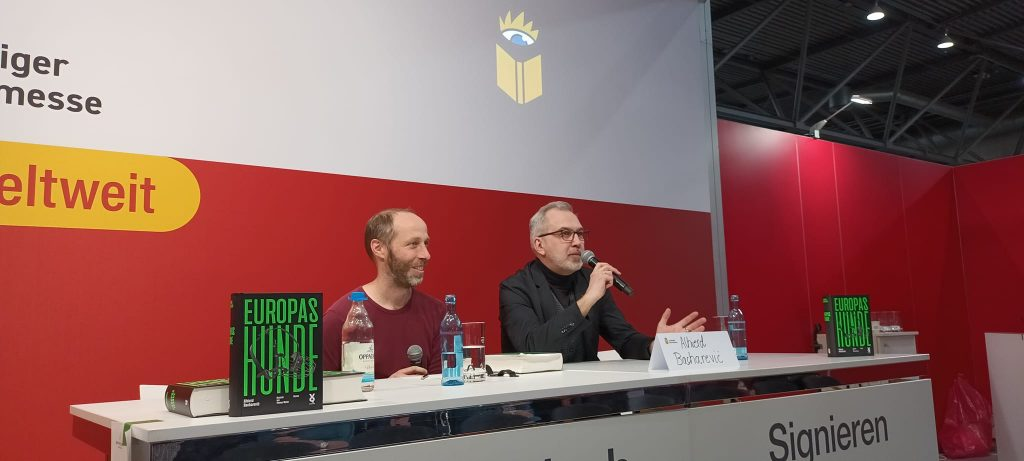
The interaction of literary structures and personalities inside and outside has a complex structure. On the one hand, there is a conflict of systems. At least two of them took place during the reporting period. At the beginning of January, the Ciotka’s Award for the best children’s book, which was happily revived in exile, included the books of the “Mastackaja litaratura” publishing house in its lists, causing outrage in the Ministry of Information of Belarus. And Saša Filipienka allegedly got into the dark totalitarian worlds of his prose. In an interview with DW on February 19, the writer told how a criminal case was opened against him in Belarus based on his own grandfather’s denunciation.
On the other hand, at the personal level, creative contacts between writers inside and outside are not interrupted. The community is in no way divided according to the place of physical residence, which is evidenced, for example, by the volume of books by authors from Belarus that have seen the light of day in foreign publishing projects in recent months. The poetic community is clearly visible on the example of the programme of the Stralcoŭ Poetry Festival on February 16-18 in Vilnius. As an illustration, let’s mention the parade of novelties of the hochroth minsk publishing project, created by Dźmitry Strocaŭ in Berlin. Languages and addresses, genders and generations are mixed here (the fact dearest to the author’s heart is the publication of Fieliks Batoryn’s poems in Yiddish).
At the end of December 2023, the website of the International Union of Belarusian Writers, Bellit.info, documented the joint efforts of national writing in a material that successfully combined genres beloved by the reader, such as the final book rating and the recommended list of literature. Everything is perfect in the title: “100 best books of 2023: the choice of Bellit.info”.
That is, from the title we learn that during a difficult year for the public community, Belarusians published a total of MORE than 100 books (the compilers of the rating even had a choice). In addition, this choice is given to the reader, it is provided by a three-digit number of “best books” (it is scary to think that the IUBW recorded a certain number of worst books).
References for comparison. The National Book Chamber of Belarus summarized the printing results of 2023, according to which 965 books and brochures in Belarusian were published, which was 12.3% of the entire book flow. The volume of Belarusian-language books and their circulation increased against the background of 2022.
Radio Svaboda compiled its traditional ranking of the books of the year after interviewing experts. As many as 5 books in different genres were recognized as the best (against 1–3 positions that topped the RS ratings in the past).
Touching on the topic of ratings, I cannot but refer to two more distinctive lists compiled by expert organizations in the field of literature. First of all, this is a list of international book fairs recommended by the Book Chamber in the first half of 2023. Its highlight is certainly the mention of the Havana Book Fair in February, authorized by the Cuban authorities (it is worth noting only because it takes place every 5-10 years, and holders of Belarusian passports can enter Cuba without a visa). But in general, the list is interesting because it can bring the Western-oriented book lover back to solid ground. It mentions the biggest events of Arab (Cairo Fair) or Chinese and Indian cultural spaces. As they say, Leipzig is not the only one… Why not go, say, to Astana?
Let’s think about vers libre and decolonization
And we switch again to the page of information about Belarusian literature, which in January shook the community with another rating – this time more ultimate: 10 young poets you should know. The publication of new names and examples of creativity generated a number of meaningful discussion posts in Belarusian social networks, which finally divided the community of authors and readers into camps not according to political, but aesthetic principles: into rhymed and non-rhymed poetry followers. According to the analogy with the stop word that exists in some, primarily sexual, games, the start word of the Belarusian shitsto… oops, sorry, debates about poetry became known as “VERS LIBRE!!!”
Although the author of these lines could not fail to note some kind of return to normality against the background of dark times, observing the dispute between the conditional Siarhiej Šupa and the conditional Juraś Paciupa.
The orientation of the native Book chamber towards the whole world is definitely a reflection of multi-vector politics, the fashion for which explodes from time to time in the ruling elite. In Belarus, it can only cause a yawn, but everything becomes more lively when we talk about the strategies of individuals freed from intra-Belarusian conventions. On March 23, the author had the opportunity to listen to the online presentation of the collection “Roots / Leaves” (Belarusian: “Карані / Лісце”) which was published as a result of the creative laboratory “Stretching” (Belarusian: “Расцяжэнне”), and was positively impressed by how the facilitators and the authors established cooperation in the feminist laboratory of creative writing, the result of which became a collection of texts.
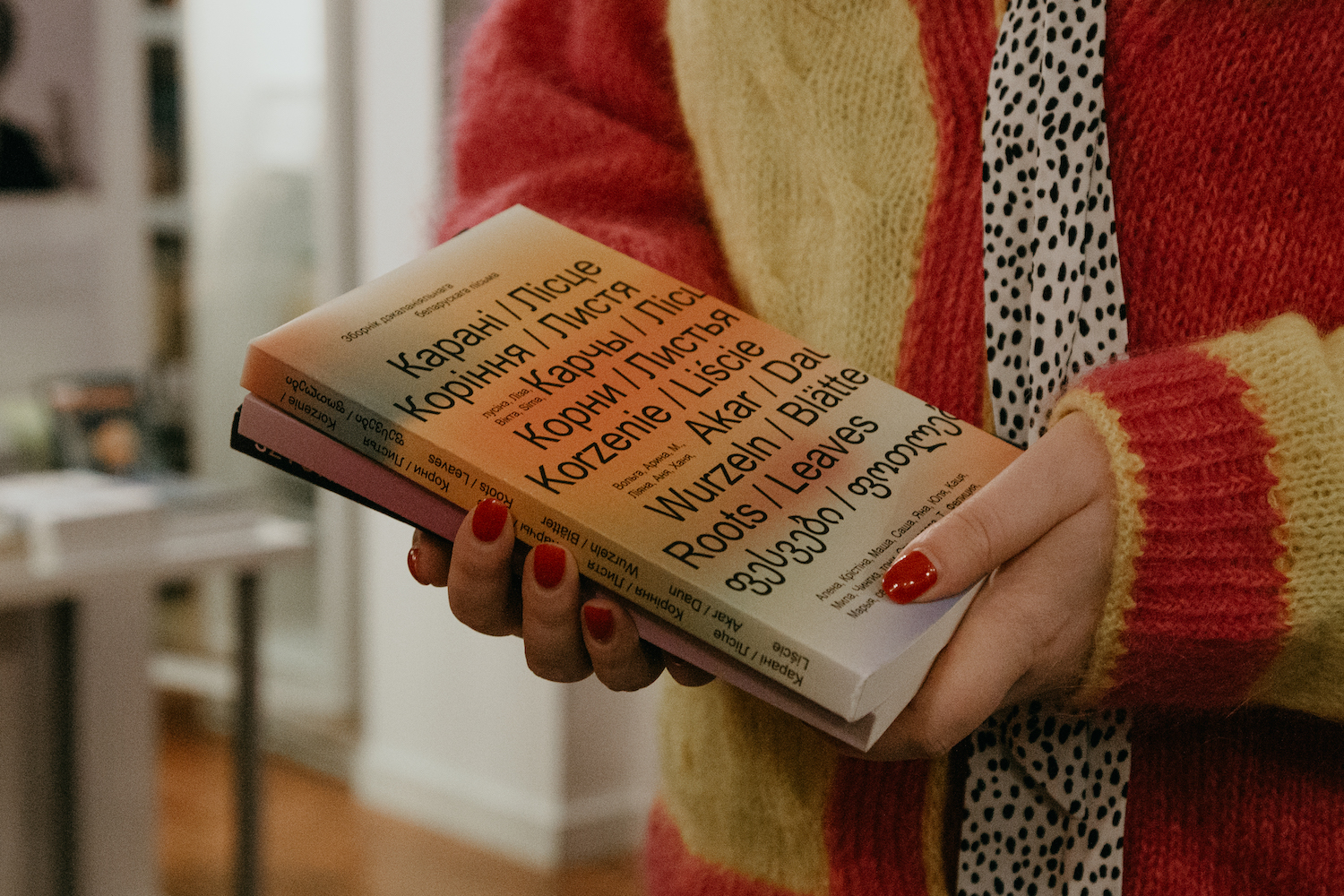
The laboratory was held in 2023 for the second time, its theme was decolonization. Laboratory participants had educational Zoom meetings not only with Belarusian women writers, but primarily with women activists and journalists from the post-Soviet countries of Central Asia and Georgia (Sakartvelo). This is how, according to the organizer Toni Łašden, the transfer of valuable experience took place, about which millennials and zoomers from Belarus know absolutely nothing. Here we should note: for the first time in the memory of the author of these lines, which reaches approximately to the middle of the 2000s, postcolonialism in the Belarusian literary context is discussed without the participation of Western or neighbouring Slavic mentors, and the experience is taken from people who live in a different geopolitical and cultural situation, having at the same time (post)Soviet background.
The course of Dinara Rasuleva, an extremely gifted poet from Tatarstan, who lives in Berlin and promotes the idea of writing in lost languages, was considered the most effective participant in the creative cooperation. Dinara’s example was an incentive for one of the participants to create an essay in the Paliessie microlanguage, which she heard from her grandmother.
Here, Paliessie: the reporting period saw the return of good old crowdfunding. The author Hola from New Zealand is publishing the book “My Granny – The Funeral Director” (original: “Мое баба – діректор морга”) in the language of the village of Opaĺ in the Janaŭski district, where her roots come from. This is another anthem of Paliessie spirit, which the creators present in a modern, attractive style. The journalist Alaksiej Dzikavicki, known recently as a writer of the Paliessie microlanguage, who positions the language of his work as the language of his native village in the Pinsk region, immediately comes to mind.
Such “solidarity of diversity” is very touching. But one cannot fail to see here the seeds of another political scandal. The best aspirations of the creators of the new Paliessie discourse in literature are obvious. And the cultivation of the distinctiveness of the Belarusian Paliessie and the Polish Podlasie region is a topic that some adherents of right-wing views from Ukraine consider dangerous. There is a belief that the Paliessie identity is an injection of the Russian special services to destabilize the borders of the former USSR.
Unfortunately, it doesn’t sound like an absurd conspiracy theory in the light of the rather serious lićvinizm scandal that has been unfolding in Lithuania in recent months. Let us remind you that for six months, right-wing radical politicians and bloggers have been accusing nationally conscious Belarusians of usurping the history of the Grand Duchy of Lithuania as purely Belarusian. Despite the fact that even the security services of Lithuania did not see a national threat in the views of Belarusians and considered the introduction of Lićvinizm as destabilizing actions of external forces, there was an unfortunate attempt to disrupt the tour of the writer and historian Uładzimir Arłoŭ through the Belarusian diasporas of Klaipeda, Kaunas and Vilnius. Three presentations still took place in March, but with certain problems: for example, in Vilnius, the event was moved to another venue, and the presentation actually turned into a duel between Arłoŭ and the Lithuanian blogger Žilvinas Svitojus, who on his Facebook page called the Belarusian living classic “the ideologist of Lićvinizm”. It is difficult to judge this confrontation based on independent media reports alone, but what is remarkable is that these reports were there, and from them it appears that Arłoŭ won a moral victory. The Belarusian writer demonstrated a benevolent attitude towards Lithuania and the Lithuanian people, presented controversial issues quite diplomatically, and won the support of the professor of history from Kaunas University, Rūstis Kamuntavičius.
We would like to express the hope that the phantom of lićvinizm, which has settled in the minds of some radicals in Lithuania, is a temporary phenomenon, and it will fade away by summer along with other exacerbations of spring.
Cinema: Searching for Funding and Audiences and Returning to Berlinale
Trends
- Belarusians are slowly integrating into the European and world cinema system. The question is what place they will find in it and whether they will not get lost in it.
- The number of events and shows is much higher than the number of new films.
- Belarusian cinema is rarely available to Belarusian viewers, but there is a great demand for it.
- To some extent, Belarusian independent cinema still remains outside the boundaries of the industry model.
- As before, it is impossible to legally shoot a film independent of state funding in Belarus.
- Belarus is still capturing the interest of Belarusian cinematographers in emigration with the events of 2020.
The main trend of the beginning of 2024 in Belarusian cinema was the continuation of its uncertain state. Cinematographers in exile were still trying to find a certain place for themselves and to understand their position in new countries. Their colleagues, who remained in Belarus, tried to understand how to continue working under the conditions of total censorship and complete dependence on state funding.
The number of screenings of previously presented films in exile noticeably exceeded the number of premieres. The topics of most of them, as before, were the state of Belarusian society and events around 2020. For new films by emigrant filmmakers, the material shot in Belarus in previous years is used. The creation and release of the films took place with the help of European and world institutions within the framework of special events in different countries, festivals and specialized screenings.
Cinematographers in Belarus are forced to obey the situation as much as possible – to look for work in state and commercial projects, including Russian production. The state mass media continue to promote the products and give word to the new management of the National Film Studio “Belarusfilm”, the corresponding officials, focusing on the upcoming centennial anniversary of the foundation of the organization “Biełdziaržkino” in the BSSR (December 17).
“Processes” split the audience
At the beginning of 2024, “Processes” (Belarusian: “Працэсы”) – a TV series of the “Belsat” TV channel – were actively discussed. In fact, the series became the main premiere of the last three months for Belarusian cinema, accessible to a wide audience on YouTube.
According to the authors-showrunners Andrej Kašpierski and Michaś Zuj, “Processes” was inspired by the popular British dystopia series “Black Mirror”. The Belarusian series has more clear comedic features. In fact, it is an attempt to survive a collective trauma with the help of laughter as a defensive reaction to the violence and injustice of the regime. In all four series, the creators make extensive use of satire and black humour. The targets of the latter are the servants of Łukašenka’s regime – riot police, police officers and officials. Each series lasts 20–30 minutes and is a separate complete story.
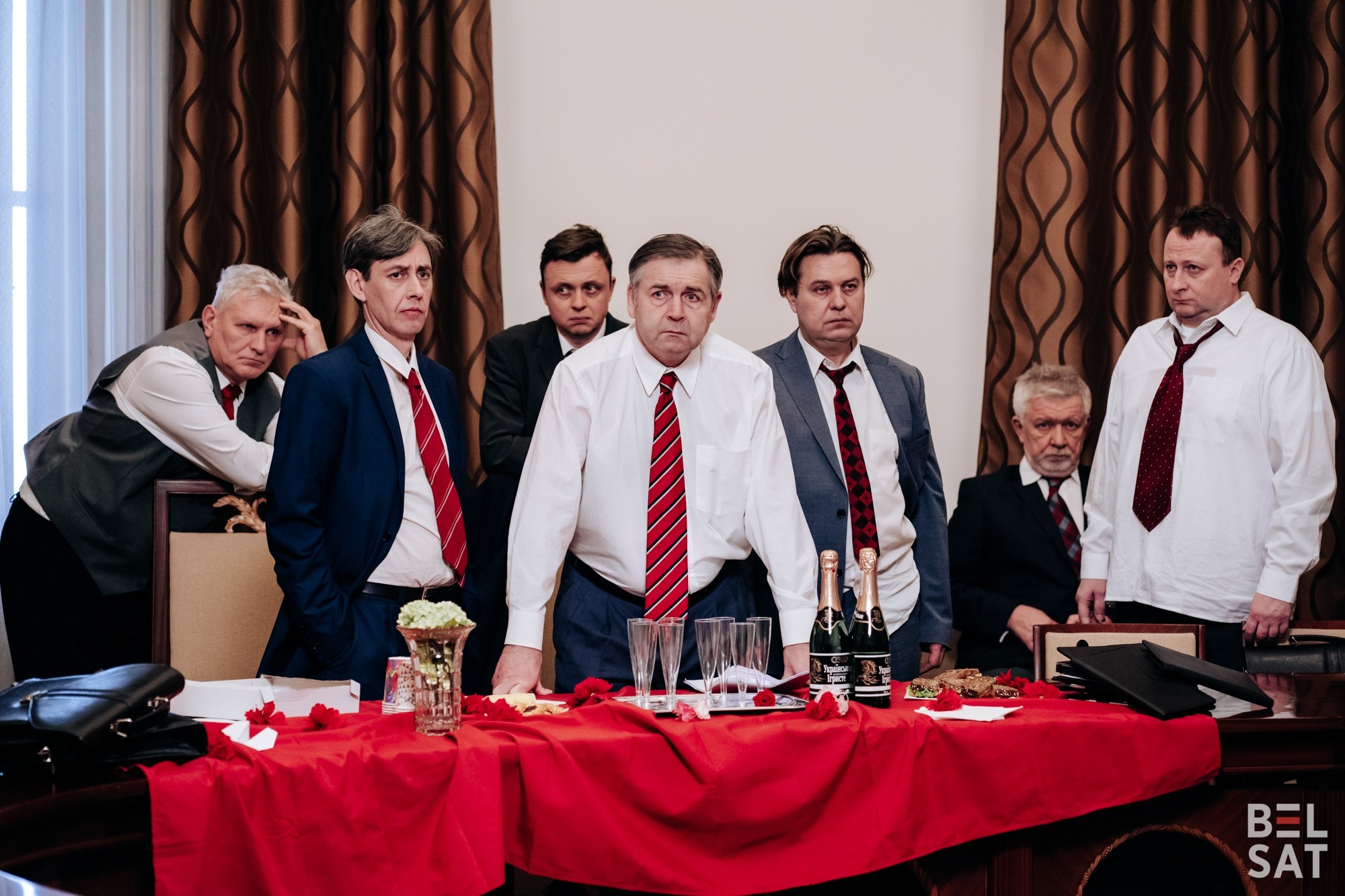
Despite the obviously modest resources and capabilities of “Belsat”, which for the first time made a feature film, the creators of “Processes” managed to shoot a professional spectacle. If the first part – “Foster care” – has clear features of a television show, then the final “TV programme” is a well-made psychological tragicomedy with clear acting and a cinematic atmosphere in the frame. Belarusian cinematographers in exile do not have enough practical experience: the example of the series “Processes” clearly shows that when there is a chance to practise, the creative team very quickly improves the result.
“Processes” caused an extremely mixed reaction from Belarusian viewers. Commentators are sharply divided between those who liked the series very much, and those who consider such a comedic approach to modern Belarusian drama very controversial. The series actually reflects not only the events of 2020, but the unenviable state of the Belarusian state and society. The episode “TV programme” is especially revealing, where the main character, played by the star of Russian cinema Yana Troyanova (the actress left Moscow after February 24, 2022), plays the role of a woman who is forced to fight with the silence of the fate of her son, who died in the conventional war. This part of the “Processes” is relevant not only for Belarusians, but first of all for the Eastern neighbours.
The authors of the series show a neo-totalitarian society in fact. The individual features of the latter were characteristic of Belarus even before the events of 2020. But supporters of a negative attitude towards the “Processes” are right in that at the time of the premiere, the conflict in Belarus looks much more acute and tragic than what is depicted on the screen.
As it became known in March after an interview with the new management of the “Belsat” TV channel, due to a reduction in funding, filming of the continuation of the “Processes” was postponed for an unknown period.
The new project “Let’s wait for him” of the well-known comedy YouTube show “ČynČynChannel” is full of absurdist humour. Conceptually and, partly, by the composition of the creators, it is close to the TV series “Processes”: its theme is “how to remain a faithful friend and beloved wife, when your husband was conscripted for a service during the Holy Special Operation.” Obviously, the authors of the project see not only Belarusians as an audience, as evidenced by both the language and the topic. The last circumstance is new for Belarusian comedy projects on the Internet.
All-Belarusian national Berlinale
The most important event was the participation of Belarusian cinematographers in the 74th Berlin Film Festival on February 15-25. However, the Belarusian presentations were mostly not on the screen.
In the short programme Berlinale shorts, a conceptual 30-minute postdoc “Unwanted kinship” by the Belarusian German Pavieł Mažar was shown. It should be noted that after Mažar’s previous film “The Guide”, which artistically describes the torture of participants in the 2020 protests, the new film looks secondary, it uses the same directorial techniques of documentary reconstruction. The author’s new film is about the personal and collective responsibility of Belarusians for the war in Ukraine, causing an ambiguous reaction among the Belarusian audience. This forced the author, who emigrated from Minsk at the age of 10, to seek understanding in an interview.
The pitching of the Belarusian Independent Film Academy or BIFA (Belarusian: БНК) was met much more positively. It took place within the framework of the European Film Market (EFM), just like the presentation of the Academy itself a year ago. However, this was the first serious activity of BIFA: this year at the Berlinale, it had a separate pavilion, where the projects of eight films, pre-selected by BIFA members from forty applications, were presented in the form of pitching with the participation of serious international experts. The purpose of pitching is to find financing for Belarusian projects.
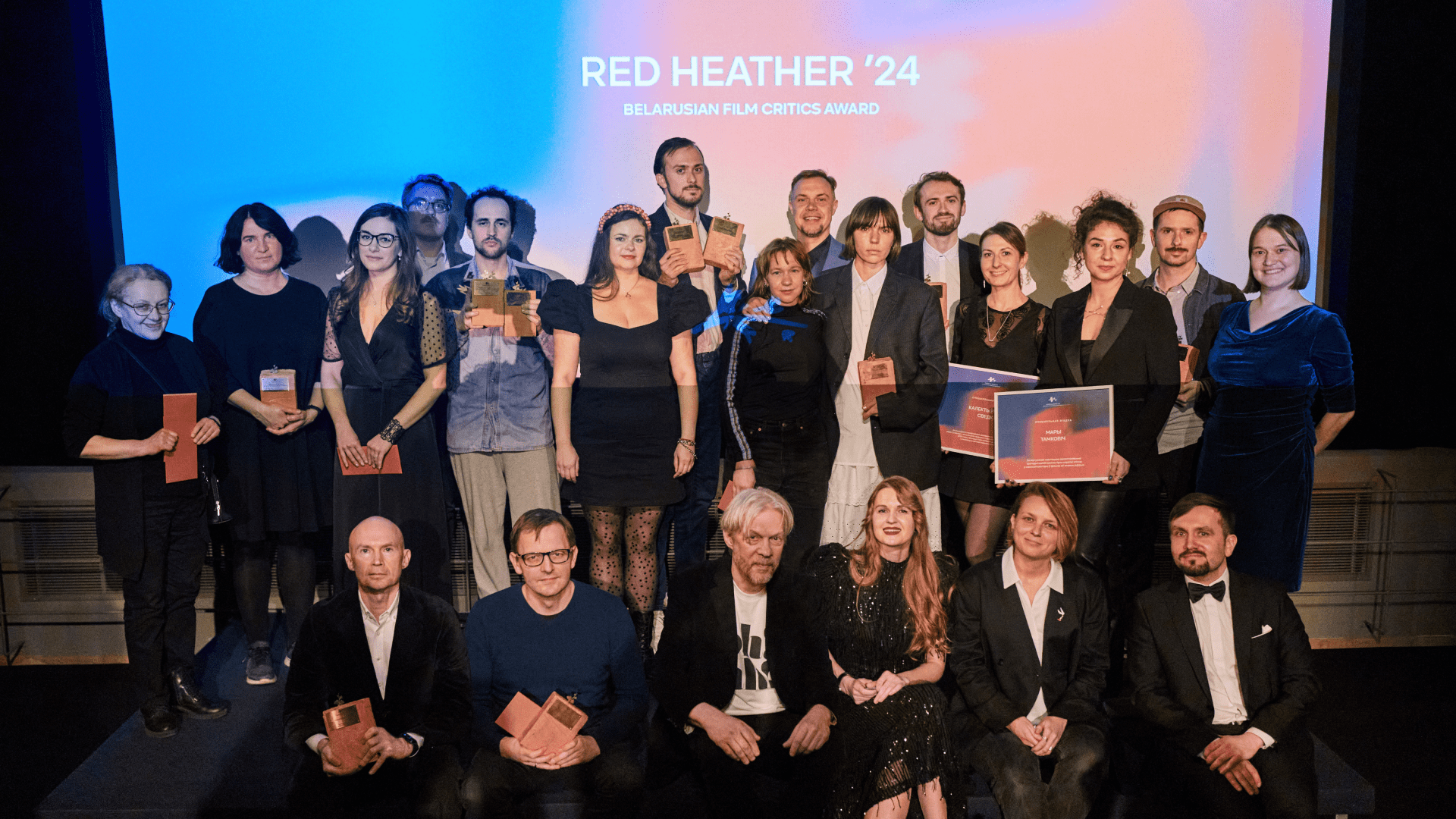
Another significant event within the European film market Berlinale is the award ceremony of the Belarusian Film Critics Award “Red Heather” (Belarusian: “Чырвоны верас”) for 2021-2022 in 13 nominations. The value of the award is that it objectively reflects the results of the domestic film process among authors independent of Belarusian censorship. The peculiarity of the films submitted for selection by the experts for the award is that most of them were created outside the boundaries of the industry model. These are artisanal, or even self-made, works in the best case. This is due to both the lack of funding and the level of preparation of the creators.
Mikita Łaŭrecki, the winner of “Red Heather” in the nominations “Best Feature Film” and “Best Director” for the film “A Date in Minsk”, successfully transformed amateur production conditions into his author’s style. His “A Date in Minsk” and another film – a participant in the nominations of A Kid’s Flick award – are the best, albeit specific works on the topic of events in modern Belarus.
Both the pitching and the “Red Heather” ceremony within the EFM Berlinale are another step towards the integration of Belarusian independent cinema into the world film community. Obviously, the Berlinale is the main venue not only for the self-presentation of Belarusian filmmakers, but also for their unification into a single film community.
Premieres in Riga
Another traditional venue for the participation of Belarusian filmmakers is Artdocfest, a documentary film festival that has been held in Riga in recent years and has attracted the attention of the international documentary community and the press.
This year it took place on March 1-8. In addition to the already known from another festival, the film by Alaksandr Michałkovič and Hanna Badziaka “Motherland” (Russian: “Родина”), Belarusian independent premieres – “Pussy Boys” (Russian: “Писюши”) by Darja Andrejanava and Mikałaj Kupryč and “I want to go to war” (Russian: “Хочу на войну”) by Alena Čarniaŭskaja. If the first film tells about the Minsk queer-community from the pre-Covid times and consists of the material filmed a few years ago, the second one is dedicated to the most current events – Belarusian volunteers on the Ukrainian side in the current war.
Трэйлер стужкі Майка Лернэра і Марціна Гэрынґа “Выпадковы прэзідэнт”
But the main film on the Belarusian theme at this year’s Artdocfest was the film by British directors Mike Lerner and Martin Herring “The Accidental President”, a full-length film about the leader of Free Belarus Sviatłana Cichanoŭskaja. The screening became one of the highlights of the festival in Riga: Belarusian events still excite the world film community. The problem is that domestic documentary filmmakers are often ahead of foreign colleagues in revealing Belarusian topics.
Looking for funding and an audience
The time lag of domestic filmmakers is largely related to the lack of funds: it is possible to get financing faster together with a foreign producer. Poles, Scandinavians, representatives of Latvia, Lithuania and Estonia are traditionally the most important partners here for Belarusians. Belarusian authors are making their way to other sources as well.
One of the participants of BIFA’s pitch at the Berlinale, a documentary project by the anonymous author of Zone|myths, was noticed by the Berlinale World Cinema Fund (WCF) and recommended for funding in the amount of 35 thousand euros.
The documentary project by Ksienija Hałubovič “I made a mistake when I came here” about the situation with the migration crisis on the border of Belarus and the European Union was selected for the industry platform (Impact Lab) of the FIFDH Human Rights Festival in Geneva. Other Belarusian projects also take part in various competitions and pitches.
The second important problem is reaching the Belarusian audience. Many screenings of Belarusian films have been held in recent months as part of various events in Poland, Germany, and other European countries. But authors and filmmakers are not very eager to upload their films on the Internet. And we should mention quite a difference in this respect with the documentary projects “Present time” (Russian: “Настоящее время”) and BYDOC, which recently presented their new releases here and here.
The online cinema of Belarusian cinema Vodblisk has been operating for a year, presenting feature films and documentaries, in part festival and author films, every month.
At the beginning of March, the animation project “Maryla. In Search of “Dziŭniki” was presented in Minsk. Eight episodes of this modern fairy tale with folklore motifs were specially commissioned by the Voka service in two language versions and are a rare example of private investment in Belarusian national animation.
Theatre: pressure, nullification and fragile hopes
The point of no return to the Belarusian pre-revolutionary theatre has already been passed. Naturally, no one will tell you the exact date. But the beginning of 2024 witnessed such a transition with ruthless openness. How it happens in practice – in our traditional review.
Repression, a bet on foreign culture and war
The year 2024 in the Belarusian theatre began with a new round of repressions that affected both performances and individual creators.
The premiere of the performance “There was Clara” dedicated to the Holocaust is scheduled for January at the Minsk Youth Theatre. Officials did not accept it at the final stage of approval. As a result, the play got into the poster only in March.
This is not the first case. In November 2022, the operetta “The Duchess of Chicago” had to be shortened by 20 minutes in the capital’s Musical Theatre in order to get permission to show it. Therefore, perhaps there are more such examples – just not all of them become public.
In January 2024, the director of the Homieĺ Puppet Theatre, Dźmitryj Harelik, was tried – he was accused of distributing extremist materials. The final decision of the court remained unknown to human rights defenders.
But in the Belarusian State Academic Musical Theatre, the director Siarhiej Pukita lost his job for the performance of Victor Tsoi’s song “We are waiting for changes!”. The composition was played during the tour of the Russian band (most likely, the orchestra from Voronezh, which performed the programme “anthology of Russian rock”). The Musical Theatre is known for its rather conservative course. But they speak well of Pukita in the theatre team – it is not yet known who will replace him.
Also, in the last days of December 2023, the artistic director Valeryj Anisienka was fired from the Drama Theatre in Maladziečna. There is no politics there: on the sidelines they are talking about a long-standing conflict with the director. During the last decades, Anisienka was more successful as an organizer of the theatre process than as a director. But he is a professional and a real find for a theatre that is not located in the regional centre: there was never a queue of directors there. Three months have passed since the dismissal, and the position remains vacant.
With such purges, the authorities are interrupting the traditions of the previous era, throwing out from the profession those who have seen a different theatre (it is no wonder that among the directors of the capital collectives there are still some of those who were appointed before 2020).
The biggest problems arose in another theatre team from Maladziečna: the threat of closure loomed over the “Batlejka” puppet theatre. It is not the first threat – in 2022, they tried to attach it to the local drama theatre as a branch. But it turned out that from a legal point of view the latter must be in another jurisdiction, which saved the team for a while.
In February 2024, the attack resumed. The officials dismissed the director Taćciana Čajeŭskaja, and also did not extend the contracts of the chief accountant, chief administrator, two workshop workers, a costume designer and two cleaners. The team discussed the possibility of merging “Batlejka” with the local Palace of Culture. The audience was informed that no one is going to close the theatre, but perhaps it will exist “in some new format”. They said, “Batlejka will definitely remain, and there will be children’s performances.” But the new format can be the existence as part of the Palace of Culture – with minimal funding and the prospect of soon ceasing to exist.
The main reason for potential closure is failure to meet planned indicators. From January 1, the state introduced new funding rules, according to which theatres must earn at least 40% of the budget. “But this is nonsense. It was immediately clear that the plans were unrealistic”, ex-director Ała Palakova straightforwardly says. Naturally, that’s how it is. In 2017–2019, the share of off-budget funds in large republican theatres reached 34%. In the regions – up to 37%. But such indicators were more often obtained thanks to additional events: paid events, a large number of entertainment products, which prevented the development of collectives and actors. Meanwhile, “Batlejka” is a puppet theatre, which, moreover, does not work in the regional centre. But officials are not interested in this.
The state did not abandon other directions in its policy. One of them is the imposition of alien ideology on the audience. The premiere of “Peter I: Life and Actions” was released at the Mahilioŭ Puppet Theatre. “The performance will introduce schoolchildren to the multifacetedness of the era and the personality of the first Russian emperor,” the announcement stated. But in 1708, Russian troops, by order of Peter I, burned Mahilioŭ. A performance in the theatre of this city, where such a person is shown positively, is terrible and cynical.
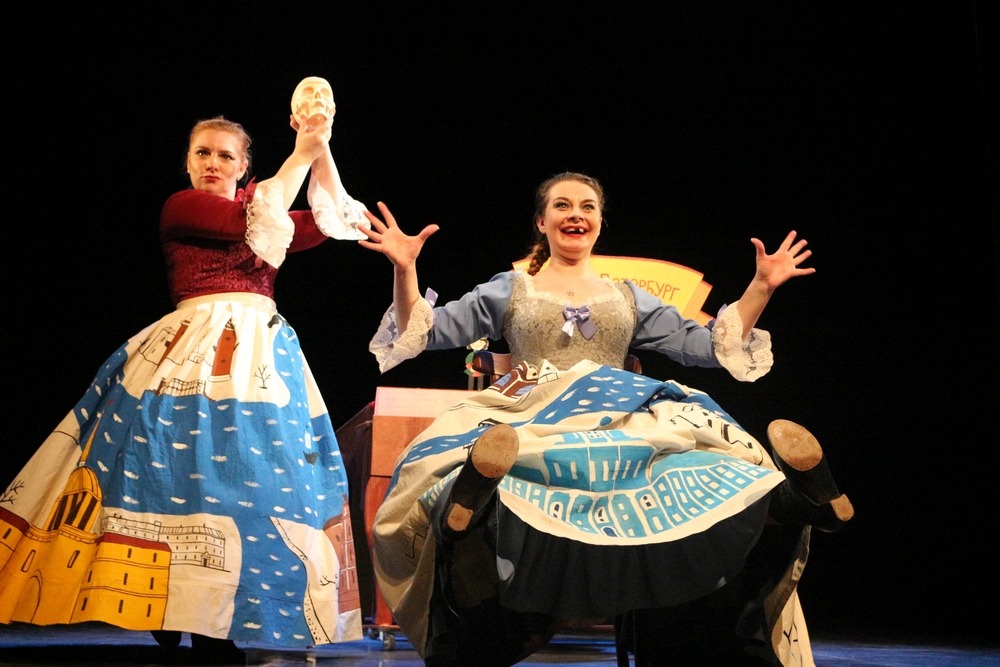
The state continues to bet on productions of military theatre plays. They premiered “The Dawns Here Are Quiet” (Russian: “А зори здесь тихие”) in the Janka Kupała National Academic Theatre, “The Cranes Are Flying (Russian: “Летят журавли”) in the Homieĺ Regional Theatre, “Nuremberg. The Dock” in Babrujsk Regional Theatre, etc.
The artificiality of this approach is evidenced by the lack of high-quality modern drama on this topic. It is symbolic that the republican competition of plays about the heroes of the partisan and underground movement during the Second World War failed. The bureaucratic wording (“due to the non-compliance of the competition materials with the main criteria of the competition”) indicates that the playwrights did not show any worthy work and did not want to show it.
Nullification and rupture of space
Through repressions, blacklists, emigration, the most global “reset” took place in the Belarusian theatre in recent times.
Single productions remained from the earlier legacy. Nothing is left from the adult performances of Alaksiej Lalaŭski, who for decades managed the capital’s Puppet Theatre, – “Mikałaša”, Uładzimir Savicki in the Belarusian State Academic Theatre for Young Spectators – “The Wild Hunt of King Stakh”, and Mikałaj Pinihin in the Janka Kupała National Academic Theatre (we remind you that these directors have already been fired). A number of performances have disappeared from the RTBD repertoire. And globally, out of the 10 best plays of 2019 chosen by domestic critics, only one is now in the repertoire: “Marriage with the Wind” by Jaŭhien Karniah.
It is with the personality of this director that the main hopes of the capital’s Puppet Theatre and the RTBD to maintain the former level are connected recently. During the last seasons, his “Pačupki” (February 2022) and “Zabałoćcie” (December 2023) were released in the RTBD. In the Puppet theatre, where Karniah first came to work, and then became the main director, there are performances for children “Smart Dog Sonya” (June 2023) and “Butterflies” (the theatre’s first baby performance, December 2023), as well as “On the black-black street” (March 2024, adult performance).
It is interesting that these two theatres faced excessive demand. At the beginning of sales at the Puppet Theatre, there are queues, and there are disputes and resentments in the collective’s social networks due to the fact that tickets sell out instantly. The RTBD shows individual performances in the Palace of Officers (its venue is much larger than the theatre hall) due to a similar excitement.
But there’s no reason for being happy because of this. After all, we are not talking about a breakthrough in art and not about radical changes in the tastes of the audience. In Minsk, the number of cultural events and especially the number of interesting events has decreased so much that the educated audience organizes a real hunt for worthy projects. Therefore, this unexpected demand is only a sign of the theatrical void that has formed after the repressions of recent years. And it inevitably becomes a test for Karnyah himself, who in the current conditions is forced to compete with himself.
In addition to actual premieres, irregular projects are also worthy of attention. Like the week of Belarusian drama under the title “Concentration”, organized by the RTBD together with the centre of Belarusian drama. This year, the programme included five theatrical readings, two lectures, a round table, a master class, and three performances. Among the readings – “Symon the musician” by Jakub Kołas, “Maroz” by Kanstancin Sciešyk, “I, granny, Iliko and Laryvon” by Nadar Dumbadze and Giga Lordkipanidze, and “London” by Maksim Daśko. One would like to hope that at least one of them will become a repertoire performance in the future.
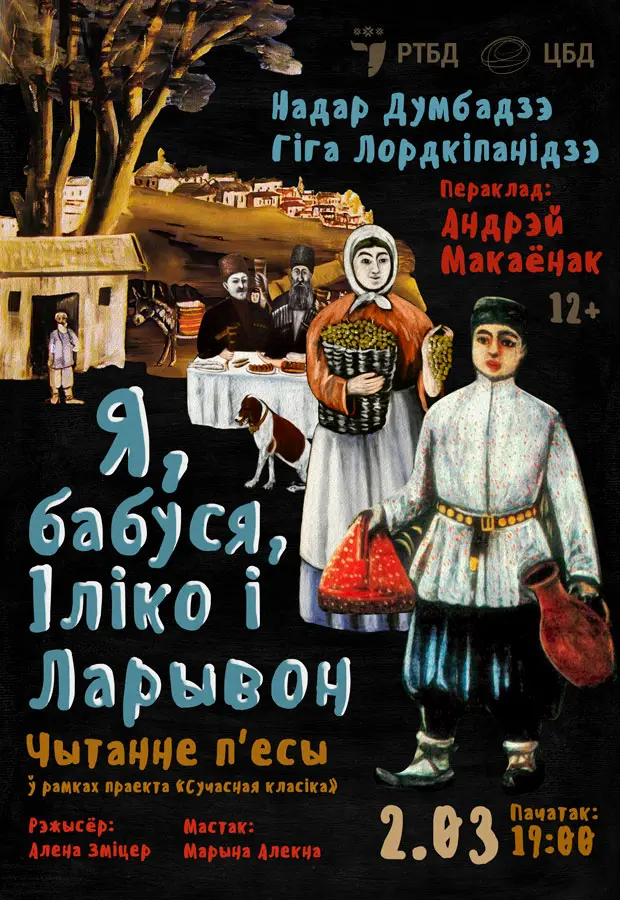
But it is not easy to see both them and the premieres. The problem is not only the tickets that are sold out instantly. The gap in the general Belarusian theatre space is becoming a new reality. There is no need for illusions: in its complete form it existed only until 2020. At that time, the presence of the Belarusian “TeArt” programme, the National Theatre Award, the regular invitation of the best domestic performances to the “M@rt.kantakt” and “White Tower” (Belarusian: “Белая вежа”) festivals, as well as few reviews in the media still allowed us to get an idea of what was happening in various domestic theatre groups.
Over the last two or three years, it has come to a gradual divergence. But now we can even talk about a gap that is observed in two layers: between the theatre in the homeland and in exile, as well as between various objects both in Belarus and abroad.
At first let’s talk about the following. For a certain time the RTBD premiere could be seen both in the audience hall and during the broadcast on the voka.tv website. The first news with a minus mark was the broadcast of the premiere “Zabałoćcie” in a very poor quality. It was not possible to form a full-fledged opinion about the production. On social networks the RTBD promised to show it another time, but that did not come true. The next premiere was “Evening” (January 2024), the online screening of which did not take place at all.
Other theatres do not host such broadcasts (the online screening of “The Barber of Seville” by The National Academic Grand Opera and Ballet Theatre of the Republic of Belarus, which was organized on the same voka.tv, is rather an exception). If broadcasts finally disappear, the diaspora risks losing live theatrical contact with the homeland.
In Belarus, state intervention, an almost complete ban on private theatre and the absence of reviews of productions, the disappearance of the “TeArt” and other things like that led to the destruction of the intra-theatre hierarchy. Life goes on in separate bubbles.
But a similar situation is observed in emigration as well. In January 2024, “the Kupałaŭcy” showed the play “Judith’s comedy” on their YouTube channel. It was their first online broadcast since December 2022, when “Sphagnum” was shown. Of course, the technical possibility of showing is likely to depend on the conditions on which the financing is given. But through this comes the inevitable distancing of the troupe from its audience. The indicative figures are the following: the broadcast of “Sphagnum” collected 13,000 views, “Judith” – 3,800. Naturally, there are many nuances. For example, the plot of “Sphagnum” is much simpler, the production of “Judith” was initially positioned as experimental, which did not contribute to the interest of the mass audience. But the troupe’s YouTube page has not been updated for months, so the situation is not surprising.

Let’s add that the authorities also dealt a blow to “the Kupałaŭcy”. Recognizing a logo, website, social networks, YouTube channel, and even e-mail as extremist will most likely dramatically complicate activities and sharply narrow the number of actors ready to cooperate.
But let’s get back to the video broadcasts, because in general, no foreign Belarusian troupe organizes them (except for the Free Theatre, whose premieres rarely take place). The diaspora has almost no traditions (and especially opportunities) to go to productions in other cities. So far, the only possibility to see them in one place is to hope that the Inex-fest will be organized again in the summer in the same format as last year (showing the best Belarusian performances in Warsaw).
Therefore, events in the Belarusian theatre diaspora have a local resonance. For example, Juryj Dzivakoŭ’s play Clausa fores with “the Kupałaŭcy” actor Alaksandr Kazieł in the lead role (January 2024). The production is positioned as “a performative act with elements of an opera, which shows the essence of tyranny and its destructive impact on the individual and society.” We should also mention Palina Dabravolskaja’s solo performance Coma (November 2023) and “It’s a 10-hour drive straight home” by Ženia Davidzienka at the Gdańsk Shakespeare Theatre (December 2023), etc.
The trend is the revival of projects in emigration that were once staged in Belarus. Vasil Drańko-Majsiuk embodied “The Happy Husband” in Warsaw (as a reading), which he himself once staged at the RTBD. Andrej Saŭčanka recreated “Harold” in Warsaw as well, and it was also shown in Minsk before. And these examples are not the only ones.
It happens that productions and actors move from one project to another. Team Theatre existed for some time in exile, and its repertoire included the documentary play “How are you?” After part of the actors left it, this verbatim play is shown under the brand of a new troupe – By Teatr (among its other projects there is a sketch of the play “Gallery”).
Attempts to unite separate pieces of the common space are carried out by the Belarusian Theatre Institute. The initiative conference on the creation of this organization was held in Warsaw last September, after which the BTI took a long break. Only in January 2024, its representatives announced the collection of information about the domestic theatre and creators in the country and abroad for the years 2020-2023. This is how the work on the archive began during this time. A series of publications on projects implemented in Georgia, Poland and Lithuania was also published in the winter. But for now, the question of creating a legal entity, as well as the activity of the BIT in other areas (except the mentioned scientific one) remains open.
Conclusions
Nullification, repression, and severance of ties led to the fact that a new theatre space with minimal ties to the previous era is being formed in Belarus before our eyes. Separate chains exist from the past: we are talking about the restoration of Valancin Jelizarjeŭ’s ballets, staged in the 1970s and 1980s, but they have a museum character.
At this stage, the goal of individual groups, actors and directors is to continue traditions, to make a return to the pre-revolutionary past possible. But the further we are, the more unlikely such a return becomes. The representatives of the internal opposition have to adapt to new realities, somewhere making inevitable compromises with the authorities.
If we take the pessimistic version, in which the current situation will drag on for years, the conditions of existence and the level of the new Belarusian theatre depend on several factors: how the old will be able to stand up for themselves and how quickly the new generation will grow, and what it will be like. And also how the old will interact with the newcomers. For now, we are in for an indefinite transition period.
Music: timid steps towards a new construction
- The list of detained artists is constantly growing.
- Potential actors of the musical movement are indicated.
- There is a tendency to unite: more collaborations and community performances.
- State cringe occupies the information space in Belarus: the underground seeps through the cracks.
- Post-punk maintains its reputation and does not concede the position of the domestic scene hallmark.
A new round of repression
Unfortunately, this text, like thousands of others, will also be about victims of persecution. In January, three members of the band Nizkiz were detained – a vocalist Alaksandr Ilin, a bass guitarist Siarhiej Kulša and a drummer Dźmitryj Chalaŭkin. Criminal cases were opened against the musicians, their trial began on March 19. Only almost a month later it became known that the guys were sentenced to 2.5 years of “home confinement” for participating in the 2020 protests.
Persecution is not limited to the case of Nizkiz. The musician of the band “Minimum Distance” (Russian: “Минимум дистанции”) was sentenced to 3 years of “home confinement”, and Uładzisłaŭ Navažyłaŭ was added to the list of terrorists. We can hardly estimate the length of the queue and its sequence. It seems that the repressive machine has a gaping hole in the stomach, and it is impossible to satiate it.
Movement potential
The Belarus Outside Sound System community is gaining momentum. At the beginning of the year, the team created the Telegram channel Belarus Music Export. Opportunities for the professional development of representatives of the Belarusian music movement are collected here: from competitions and showcases to scholarships and information sessions organized specifically for the audience of the channel. The style and delivery is taken from the sekktor channel. But if the latter generally focuses on all creators and activists, then BME focuses exclusively on music, and therefore finds more specific offers. In addition, now the musicians’ path to opportunities has become shorter. With such a schedule, there is hope for certain changes, because experience shows that it is easiest for a Belarusian artist to act with a direct offer.
The team has big plans: on the sidelines there are talks about a music conference and new charity events. Which of these plans will come to life and what impact they will have, hopefully, we will see in the next review.
For the time being, I suggest paying attention to other promising actors. The newly formed source “CLICK” (Belarusian: “КЛІК”) emphasizes short notes about releases, but more and more often the team turns to large materials. They try to analyze the auditions of local artists and initiate discussions. Among the project’s ambitious plans is to establish connections with labels and research the music market. As of today, there is still a lot of amateur stuff in “CLICK”, but in this case, great enthusiasm can become a decisive factor in development – we were missing genuine enthusiasm here!
Successful collaborations
This winter we were blessed with a number of successful collaborations. Uładź Lankievič and musicians from the band Relikt created a joint project Filamaty. It is an attempt to understand the members of the student society, who 200 years ago were arrested, imprisoned and expelled. Their stories resonate so strongly with ours that you may get lost while trying to understand whether it is about the past or our present. The songs are not yet available for streaming, but the debut video is already available on the Perfaratar YouTube channel.
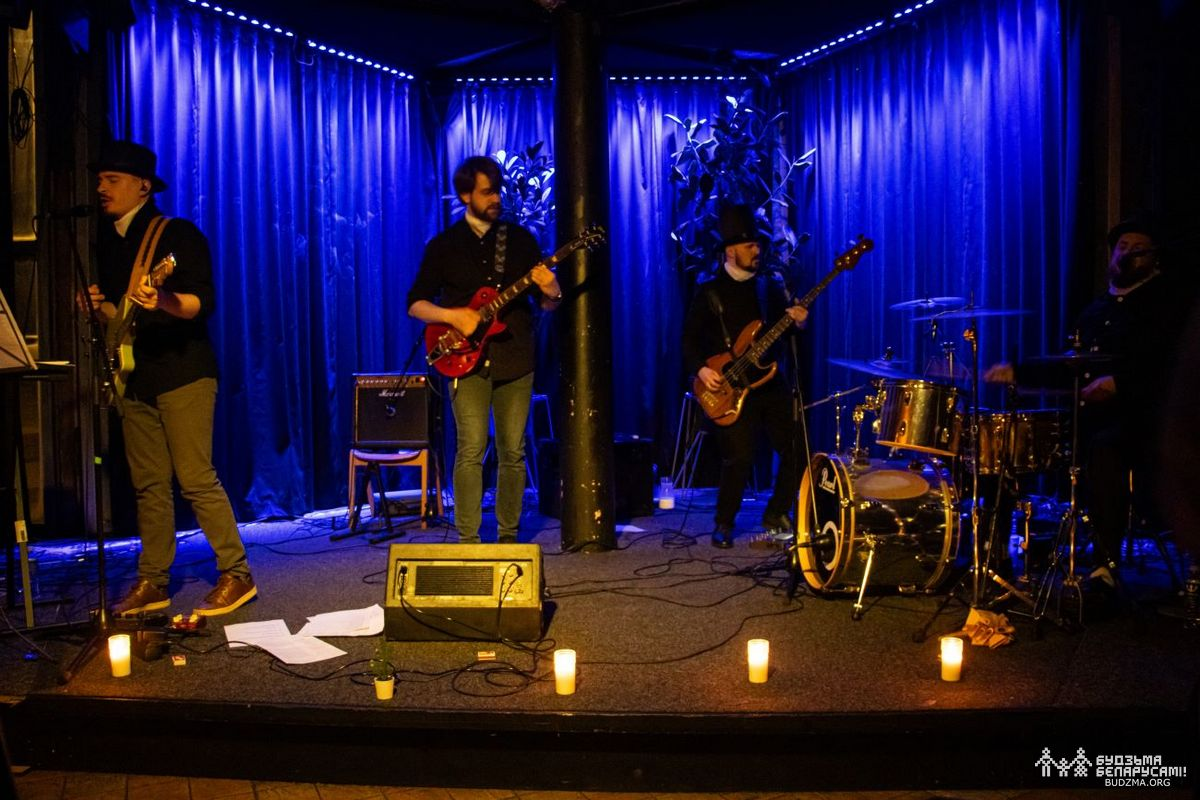
The newly formed band VVaxplay released the outstanding album Dust & Haze. Ania Ždanava and Stas Muraška are the regular members of the band. Mikita Arłoŭ, Filip Pietčanka, Anton Šnip and Ihar Łatuška joined the recording sessions for the album. The result is a Belarusian supergroup that plays smooth and mysterious vintage pop.
Volha Padhajskaja is writing a concerto for cello and orchestra in Salzburg – the work is specially created for Ivan Karyzna and Vital Aleksiajonak. There is no opportunity to get acquainted with the material yet, but, taking into account the level of professionalism of the participants, we can be certain: the concert will be a worthy premiere.
On the COS Torwar stage in Warsaw, Ksiuša from Naviband sings a duet with “Bi-2”. Besides, the musicians announce the release of a joint track. Spievy and Kasary – a women’s choir created by Rusia Šukiurava, and a men’s choir assembled by Siaržuk Doŭhušaŭ – organize joint performances.
The trend of uniting individual performers is more visible abroad. Sometimes, the banal impossibility of playing with the regular band members definitely comes into play. In addition, artists quickly come to an understanding: if you stand on each other’s shoulder, the chances of getting somewhere will increase. The desire to stay among their own is still winning, although in Warsaw they are already making uncertain and modest efforts to embrace the locals.
The organizers invite young Polish bands to take part in some Belarusian music festivals, and Belarusian artists make an opening speech in Polish at their concerts with unfulfilled hopes.
Trash content in plain sight and a decent initiative in the underground
A significant part of reality in Belarus consists of rather worthless content. State media call the main musical event the “Song of the Year of Belarus”, which once again took place in Minsk. Hanna Błahava won this year with the song “In the plot of my name” (Russian: “В сюжете имени меня”), and it seems that the success of the composition was brought by the text. Its author (and at the same time Łukašenka’s daughter-in-law) periodically collects various awards. As for the “Song of the Year”, I think they haven’t done their best in that matter, because there are works in the songwriter’s creative list that are obviously more suitable. For example, “Ah, Alexander” or the anthem of the Prosecutor General’s Office.

Poster stands and billboards at this time are filled with announcements of performances by Russian artists of dubious quality and various pop hits. In April, for example, they offer to choose between Stas Mikhaylov and the Discotheque of the USSR. Such a list of events may look like a bad joke, but it is exactly what takes up information space. In fact, passive listeners choose what they can reach, and now Rusłan Alachno with the song and dance ensemble of the Armed forces is at hand.
Such events have always happened in Minsk, with the only difference that now there are not enough alternative offers and it is much more difficult to find out about them. Small concerts of Belarusian musicians are completely ignored by aggregator sites. But, in contrast to the cringe movement, they still exist, although they are almost always organized for an audience of up to 100 people. For example, live jazz and funk can be heard at accidental point. “Proletariat”, opened in 2023, is a new centre of attraction for techno artists, which occasionally hosts live performances. The club “TNT” very hesitantly gets rid of the addiction to cover songs. The club “Brugge” reopened with a new owner: the venue was idle for three years, but now it is again available for local metal, rock and post-punk. At the reopening of the club, there were more people queuing to enter than “Brugge” could accommodate.
Compared to last year, there were more worthy concerts. It seems that local clubs and organizers are finding ways to negotiate and get tours through someone with “party organizational rights”. Others arrange concerts, which you will not find out about from open sources. “Apartment concerts” are only for the selected few people and there are underground gigs whose venues can be revealed only by your friends. One day the most interesting pages of the history books will be written mainly about them.
Global success of post-punk
Belarusian post-punk artists continue to actively tour abroad. During the beginning of the year, Dlina Volny played concerts in European cities, and Nürnberg finally reached Latin America!
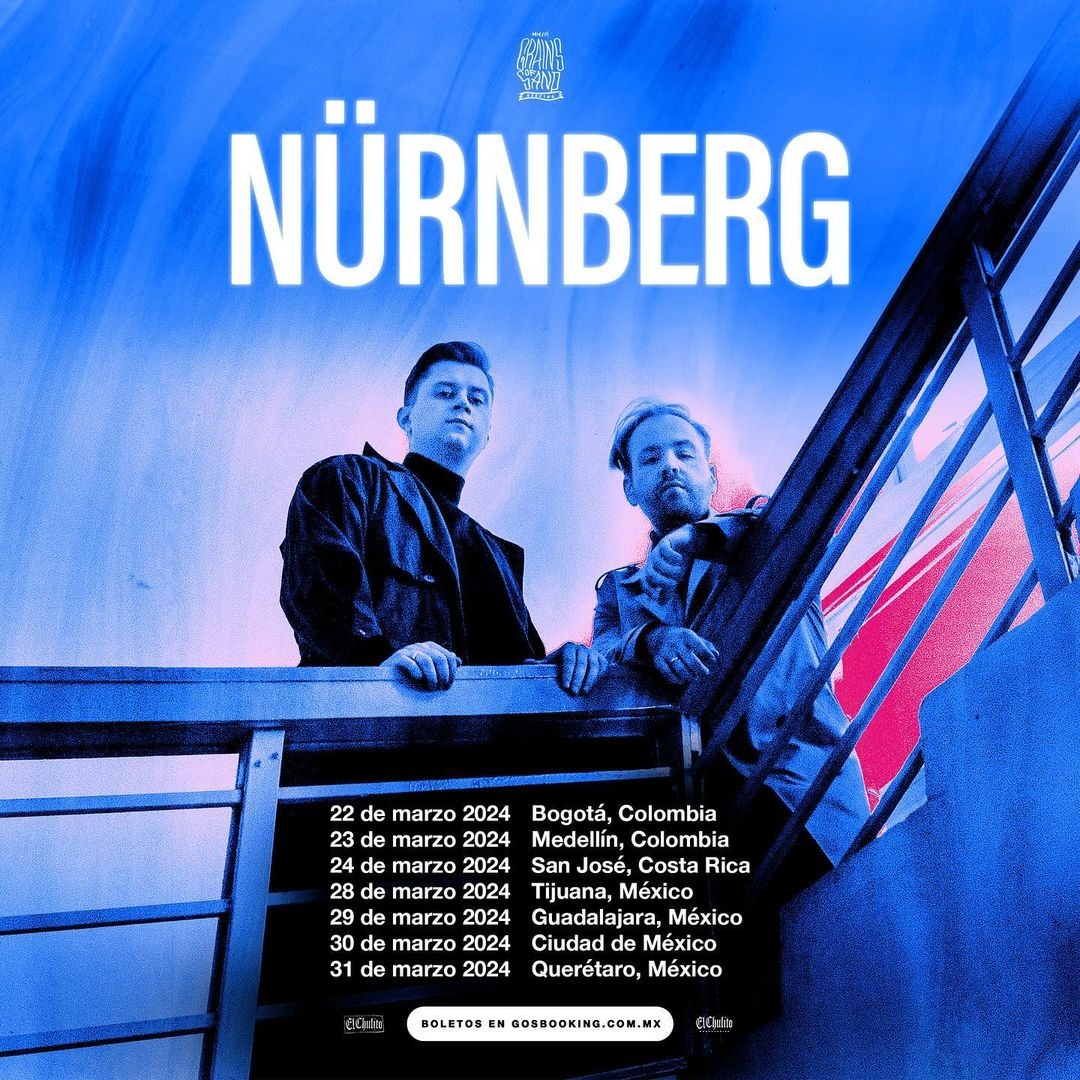
Post-punk has long become a hallmark of the Belarusian scene – this goldmine has not been exhausted for about four years. Tours in Mexico and neighbouring countries have already been organized by Molchat doma, Dlina Volny and Super Besse. But what distinguishes Nürnberg from the former is that they brought the Belarusian language to Latin America.
Conclusions
In the country, the state system occupies space with ballroom dances in the name of Spanish shame and continues to feed itself with new detentions and trials. It is very difficult to maintain a creative mood in such conditions, but musicians and organizers invent new forms of existence and try to fit into the current rules of the game. It is not possible to assume that a couple of dozen permitted concerts can be considered a weakening of the system. Rather, it indicates isolated cases of individual contracts between the parties, which, however, had to begin at some point.
Abroad, musicians leave the stage of adaptation and start moving ahead in new circumstances. Individual actors begin to propose certain solutions and activities. Musicians unite, reassemble their bands and most often stay among their own, although they make timid approaches to embrace the locals. It looks like training for a run, although you can spend a long time in this state and, let’s be honest, the space for running is not super-friendly.
Domestic post-punk can boast of stable results: having jumped on the wave of popularity four years ago, the heroes of this genre have been riding it until now. It will be interesting to see if such a fate will befall the Belarusian funk, which shows good streaming statistics.
What to listen to
The aforementioned VVaxplay and Filamaty, and also
“Мутнаевока” – “Антыдэпрэсанты” (Mutnaje voka – Antidepressants)
A mini-album with bold lyrics and arrangements from musicians who work hard. This time, a release with mixed styles – the band strives to push the boundaries.
Very strong visuals and a touching song. The central theme is the loss of home, which is relevant even for those who have never left.
New longplay in the usual style for the band. It is worth getting acquainted with what Latin America listened to in March. To make the stars abroad be the stars for their Belarusian listeners.
A Spanish-language song about jamón from the ambassadors of the scandal. At their performances, Rap&Vogue put on a real show, and they juggle languages in their lyrics. Few people on the Belarusian scene have such courage in self-expression.
Traditional Culture: A Move Toward Integration
According to our expert, traditions and folklore strongly influence the life of Belarusians in the country and abroad. This, of course, can be argued. We are modern city people, many of us did not have grandparents in the village: what are these traditions? However, love for Belarusianness is often (though not always) accompanied by curiosity about traditional culture. It serves as an important factor in the integration of conscious Belarusians. We built the review according to the principle “from the greatest integration potential”: traditional holidays, dances, singing, crafts. This does not necessarily mean that the integration potential of crafts is low. Community creativity, for example, during master classes, unites people no worse than a celebration, but it is a more individual activity, and a celebration requires a community, although it can certainly be celebrated independently.
Holidays
Since the beginning of the year, Belarusians have celebrated Christmas (Belarusian: Kalady), Hramnicy (February 2 in the Catholic tradition and February 15 in the Orthodox tradition), Maślenica / Zapusty (the second name for the period before Great Lent is more typical for Catholics), Easter according to the Gregorian calendar (this year it fell on March 31). At the end of March, several city events of the Call of Spring (Belarusian: Hukańnie viasny) took place. Here are listed the holidays of the corresponding period, which were considered “big” (important) in the traditional, rural culture. Let’s see if they still occupy the same honourable place in modern Belarusian mass culture.
In the USSR, Kalady / Christmas as a religious holiday (and religion, as you know, was considered “opium for the people”) was replaced by the secular New Year. In post-Soviet Belarus, Kalady / Christmas is celebrated in the family circle by elderly villagers (and that is not the case in the whole country) or religious people. In a broader than family, public circle, the traditional Kalady / Christmas carolling with a walk around the people’s houses is preserved in southern Belarus (January 13), and in the western Belarusian areas with a Catholic population, there are walks on the Three Kings (January 6). The majority of such tours take place with significant support, and sometimes at the initiative of cultural workers, which indicates a strong degree of institutionalization of traditional holidays in Belarus.
Urban lovers of traditional culture celebrate Kalady / Christmas in the city or go to the countryside. The basis is often the Paliessie script with the Goat, the Bear, the Gypsy, and the Jew – regardless of where the round takes place, which indicates the unification of Kalady / Christmas in amateur circles. In Podlasie, Belarusians who came from Belarus are looking for a joint Kalady / Christmas scenario with local Belarusians, who didn’t have a tradition to dress up as Kalady / Christmas characters, but they only wore a star and sang songs of church origin. As a result, two different carollings are obtained.
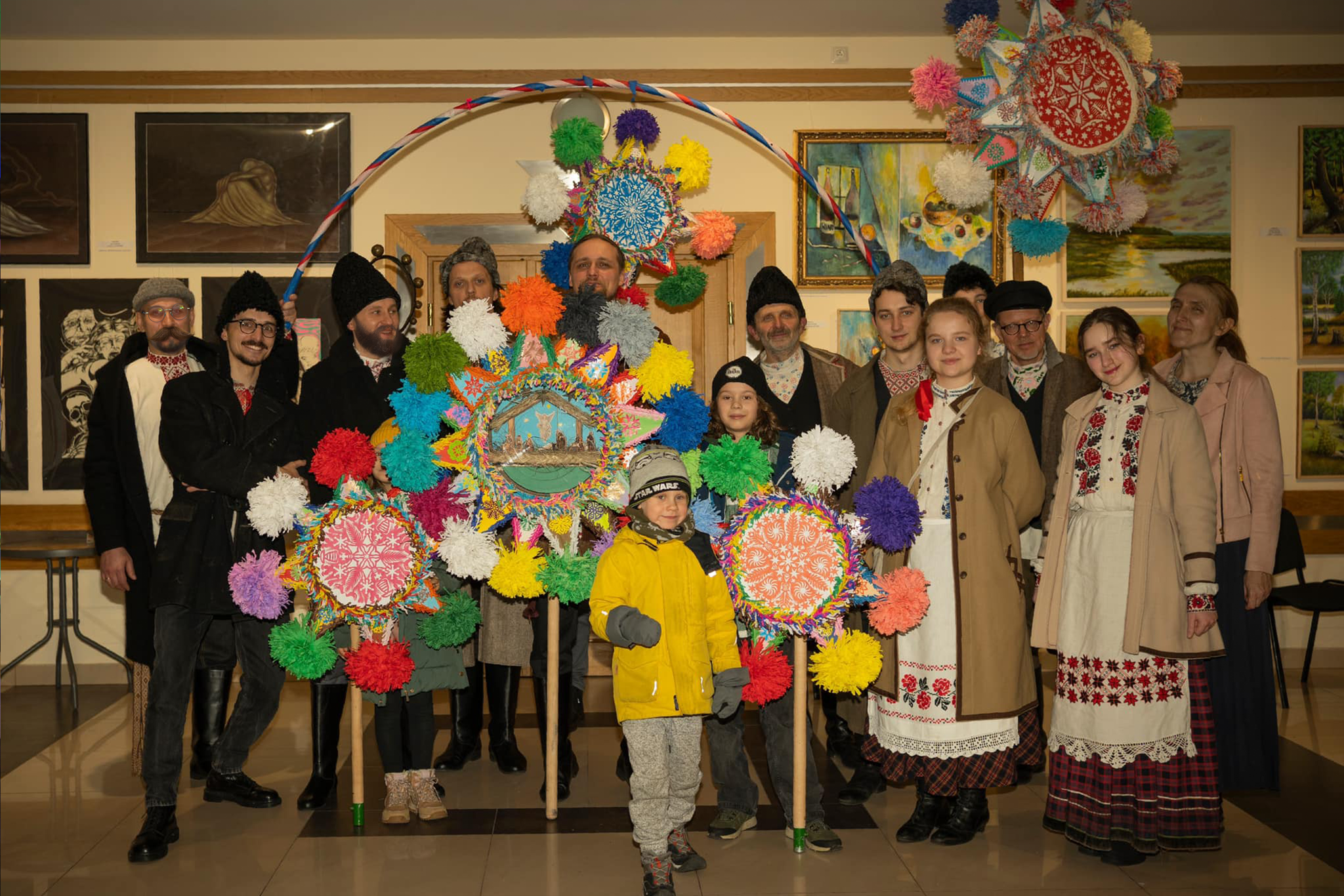
They start preparing about a month before: carollers gather, learn songs, make masks, rehearse the script. It functions as a pre-order most often. The same group can carol only once or several times per season. Tours are usually timed to the day of the winter solstice, Kalady / Christmas or New Year’s Day. This year, such reconstructions of village Kalady / Christmas celebrations took place in several large cities of Belarus and abroad, where there are many Belarusian emigrants. In Warsaw, there was a school of Kalady / Christmas carollers at the School of Belarusian Traditional Culture, which anyone who wanted to could join, which is rare: usually city groups of Kalady / Christmas carollers consist of people who already know each other.
Batlejka (a.k.a. “the nativity scene” in English) was originally a Kalady / Christmas tradition, but now puppet shows are based not only on biblical themes and are often performed all year round. For example, the Choir of Free Belarusians tours all over Poland with Batlejka performances. The repertoire includes, in addition to the traditional Christmas production, the performance “Kupała. The Beginning” and “Land of Treasures” based on Belarusian folk tales. And on March 24, the premiere of “In Search of the Desired Country” based on Astrid Lindgren’s book “Mio, my Mio” / “Mio, my Son” took place.
Hramnicy went unnoticed. We know that sometimes in the circle of lovers of traditions, communal Sukańnie of Candles (i.e. making candles from wax) is appropriate for the holiday, but this year we do not have information about such events. This holiday does not occupy a significant place in Belarusian mass culture. However, on February 2, Belarusians celebrate the birthday of Kastuś Kalinoŭski. We think it is very symbolic that the Belarusian national hero was born on Hramnicy day: according to folk beliefs, thunder can be heard from this day. On March 22, on the vernal equinox, Kalinoŭski was executed, and this is also symbolic: on this day, the Call of Spring (Belarusian: Hukańnie viasny) often took place.
In some local traditions, singing could start as early as on Hramnicy day, and in general, spring songs were performed until Kupalle / Kupala’s Night. However, there were usually solemn days when the Call of Spring / Hukańnie viasny was especially massive, and most often they fell on March 22 (the feast of Forty) or the Annunciation / Dabravieščańnie (March 25 in the Catholic tradition and April 7 in the Orthodox tradition). Urban communities of lovers of traditional culture arrange singing both in Belarus and abroad. This year, the Call of Spring / Hukańnie viasny in Viazynka near Minsk was moved from March 24 to April 7 by order of the Ministry of Culture as a sign of mourning in connection with the terrorist attack in the Crocus City Hall near Moscow on March 22, which indicates the strong dependence of Belarus on the Russian information space. The Call of Spring / Hukańnie viasny at the Belarusian State Museum of Folk Architecture and Lifestyle in Aziarco near Minsk took place on March 23, which probably indicates the slow response speed of the Belarusian state system of cultural institutions to extraordinary events.
Maślenica / Maslenitsa is celebrated in Belarus both in cities and in villages on the initiative of state institutions of culture. Most often, they celebrate it according to artificially created scenarios of “winter celebrations” created in the Soviet era: with the burning of scarecrows, contests, baking pancakes in the yard. The celebration of Maślenica / Maslenitsa in the family circle is usually limited to cooking pancakes. In some villages, they celebrate it according to local traditions. The lovers of Belarusianness can sometimes hear that Maślenica / Maslenitsa is not a Belarusian holiday, but a Russian one, but this is not true. To debunk this myth, you can read the volume dedicated to this holiday from the series “Belarusian Folk Art”, which was recently posted on the Internet, or watch the thematic programme on the YouTube channel “What are you talking about?” (Belarusian: “Чаго брэшаш?”).
A lot of Belarusians celebrate Easter (Belarusian: Вялі́кдзень) in the family circle. The diaspora in Vilnius organized an Easter festival. In Warsaw in March, even before Easter according to the Gregorian calendar, the School of Vałačobniks started work, which is unusual for a number of reasons: like carolling, vałačobnictva (going around houses with congratulations on Easter) in the circle of lovers of traditional culture was usually organized by people who already knew each other, and now anyone can join the School; anyone of any gender is invited to attend the classes, although traditionally the singers were men. These events testify to the wider presence of Easter not only in private or religious, but also in public space.
Dancing
Dance parties gather more participants than regular classes or individual dance workshops. This is a fairly easy way of integration: most Belarusian traditional dances can be performed with minimal or no preparation. Classes and parties of traditional dances are permanently or occasionally organized in at least three large cities of Belarus, six cities in Poland and also in Vilnius. There is a growing demand for dance master classes in Belarusian diasporas in the countries far from Belarus – Germany and Switzerland. The popularity of dances indicates that they play a significant role in the self-identification of conscious Belarusians. For example, on Freedom Day in Warsaw there was a dance set to live music by the band “Lity Taler” (Belarusian: “Літы талер”).
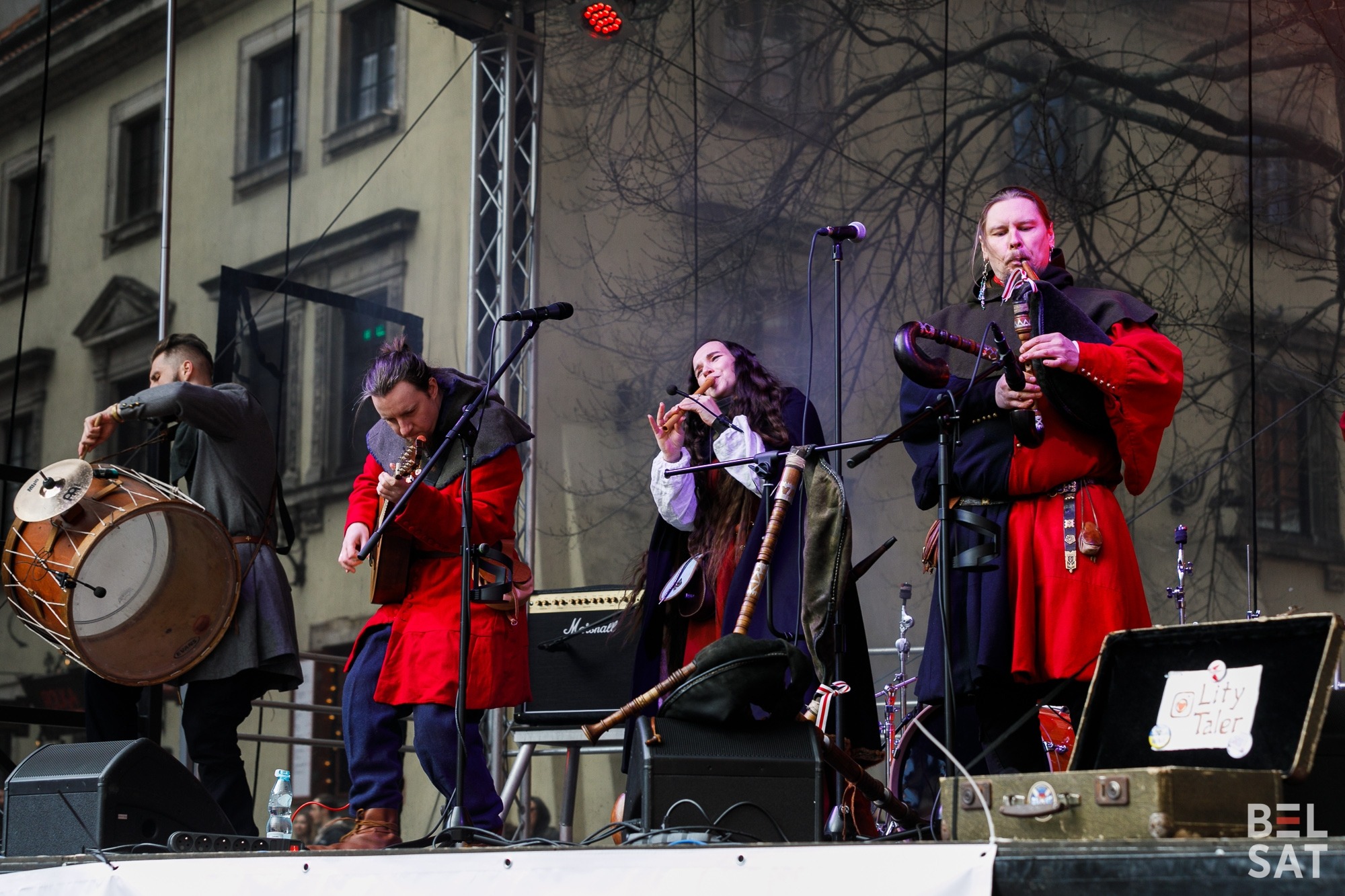
Poles are also interested in Belarusian traditional dances: they come to parties and master classes in different cities. In a series of Polish traditional dance workshops at the Embassy of Traditional Music in Warsaw, aimed primarily at Poles, Belarusian master classes take place every few months. This once again testifies to the great integrative potential of traditional dances – both for Belarusian communities and for the adjustment of the life of emigrants from Belarus in new countries.
The “Tradition” project made a series of videos about Belarusian traditional musical instruments, most of which were used as an accompaniment to dances.
Singing
Community singing unites no worse than dancing, but singing requires more training. Moreover, a traditional singing group was rarely large, a choir is a completely different art form. Singing groups operate in virtually every rural club in Belarus. Among urban lovers of traditional culture, traditional singing is also popular, but it is still not as widely practised as dancing. We know about singing classes and groups in at least three large cities of Belarus, three cities in Poland and one in Vilnius. Singers are often invited to perform at Belarusian events of a more general profile: exhibition openings, award presentations, etc. The men’s traditional singing group “Kasary” (Belarusian: “Касары”) performed together with the rock band Relikt on Freedom Day in Gdańsk. This can be considered a reversal of the previous trend, when Belarusian artists combined traditional female vocals with modern music.
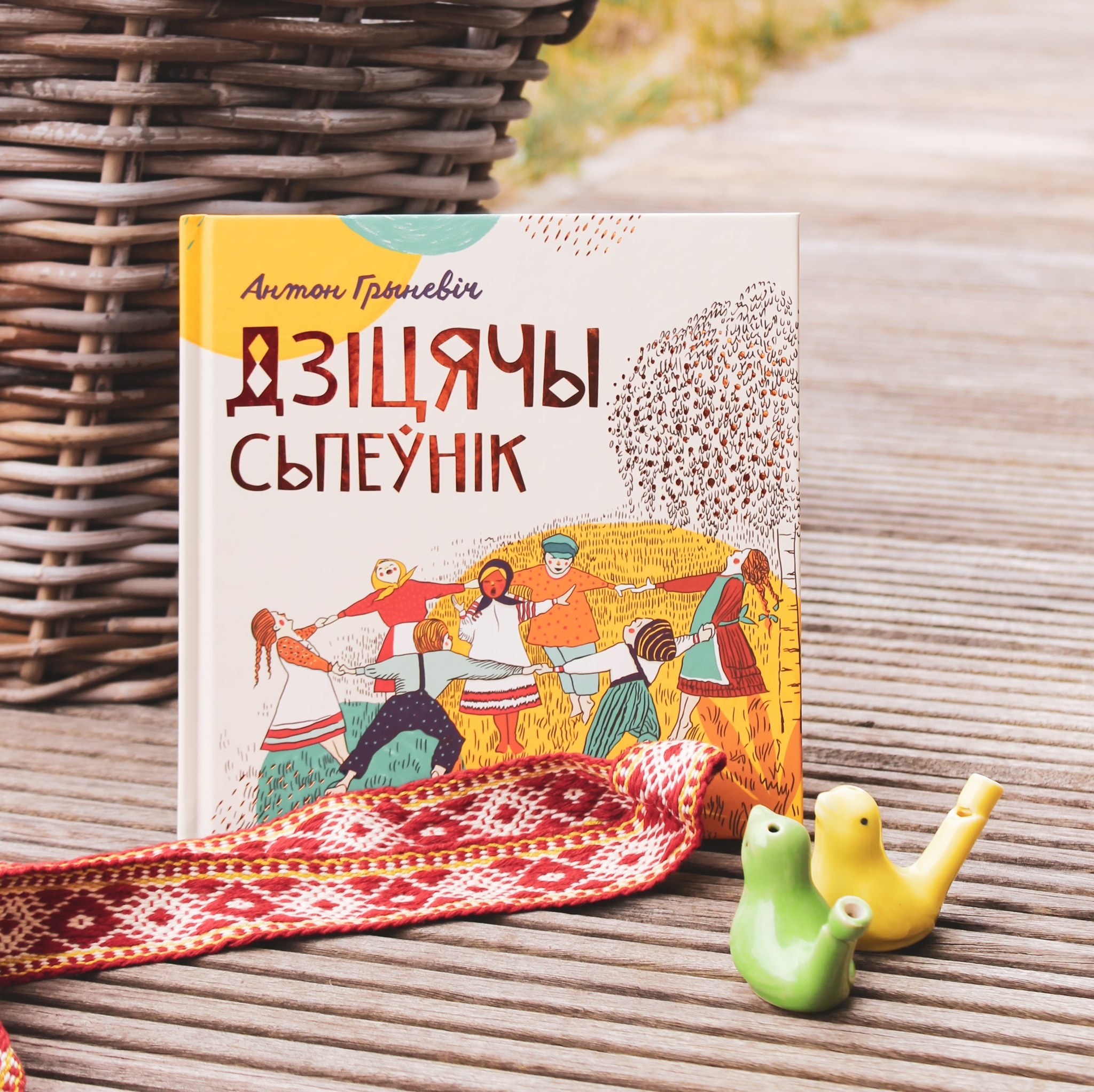
In the first quarter of 2024, the band “Asočniki” from Podlasie (a region of Poland where ethnic Belarusians live) released an album, and “Belarusian Children’s Songbook” with recordings by the repressed folklorist Anton Hrynievič was released. The songbook “Men’s Songs” is being prepared, the release of which can be supported, as well as the release of albums of authentic Belarusian collectives (you can support here). These projects show the demand for traditional singing.
Crafts
Of all traditional crafts, most attention is paid to the production of the traditional costume. Regular classes dedicated to it take place in at least one large city in Belarus and one in Poland. Master classes are sporadically held in two other Polish cities and in Vilnius.
In the first quarter of 2024, the publication of videos from the series “Traditional costume” continued including clips dedicated to topics about which there was quite little information until now: the Polack costume and men’s traditional clothing.
An exhibition of traditional textiles “Mother’s Looms” (Belarusian: “Матуліны кросны”) was held in Viciebsk, and a number of thematic curatorial tours were held in the Homieĺ branch of the Vietka Museum. In Vietka, a part of the exposition was renovated, and now you can see an exhibition of bedding there.
Recommendations
The new issue of the “Belarusian Folklore” (“Беларускі фальклор”) magazine, which is indexed in the international scientific database Scopus from 2024.
Read the volume dedicated to Maślenica / Maslenitsa from the series “Belarusian Folk Art” or watch the thematic programme on the YouTube channel “What are you talking about?” (Belarusian: “Чаго брэшаш?”).
Video from the series “Traditional costume”.
A series of videos about Belarusian traditional musical instruments from the “Tradition” project is here.
Documentary series “Beekeepers of Ubarckaje Paliessie” (Belarusian : “Бортнікі Убарцкага Палесся”) – here.
Channel of the Vietka Museum – new videos about textiles, folklore and icon painting.
You can follow notifications about Belarusian dance parties abroad in the Facebook community Kroki Trochkroki “Крокі Трохкрокі”.
